the potential
Quite a caveat: a hole has the potential to be a posthole or a sinkhole.
the potential
Quite a caveat: a hole has the potential to be a posthole or a sinkhole.
However, feedback is an important consideration for all learners, instructional designers, future teachers, technologists, academic deans, and others.
Feedback and feedforward are terms adopted from systems theory and should be adaptable to learning and instructional design.
Holly Fiock
Here is her website.
Here is her professional email address taken from that website: hfiock@purdue.edu
Here is some of her research: https://scholar.google.com/citations?user=mqd1IPUAAAAJ&hl=en
But that doesn’t mean you know how to use them to improve your feedback.
Or that anyone knows how to use them. I don't see very much happening.
a powerful force
Not sure I want powerful forces. In nature they tend to be destructive.
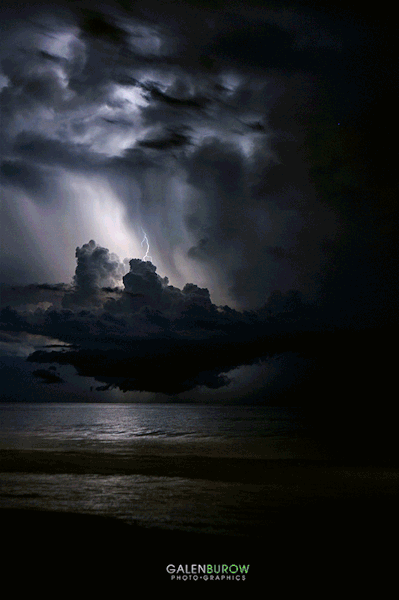
How did you experience feedback from your own instructors?
I share two of my earliest college papers with my students. I show their feedback. I also note that I got no chance to revise for improved grade. How's that for feedback? Get it perfect the first time. Old school is just dumb.
Kevin, playmode
"And death shall be no more; death, thou shalt die."
when the world blinks
Unthink it through?
What are we to do
Undo? Re-true?
I ask you: true
what do we do?
looking for a clue
with an attitude.
I find myself all askew –
I find myself en-queued
Give us this day.
Implicit is "our daily bread" and "forgiving us our trespasses", but I left them off on purpose because all I need at the end is one more day. That's all I want. All I want.
It has always bothered me that I cannot annotate an annotation. I can reply to it, but I cannot create that recursion I love so much in a mirror.

Disappointing echo of crickets.
It could be your neighborhood or city.
Or maybe you live in the hills and hollars. No wait no one lives in the fucking hills and hollars. Hollar got no cred. Hollars just a shadow slipping in the greater dark.
you write.
I just did. Didn't you see it?
they hope for
If you have read this far, and you still have hopes and you are at Dante's verge midway upon the journey of your life and finding yourself within a forest dark and from the straightforward pathway been lost and seeing this above the lintel of doorway to somewhere: "Lasciate ogni speranza voi ch'entrate" then be disabused. I am empty of expectation. I don't even use the word hope. If you do use that word, you better be ready to die to back it up and go all the way through every bolgia of hell shouting hope at every denizen and out Satan's bunghole just like Dante and Virgil
What do people fear in your home?
We fear being unable. Unable to remember words and people and our own children. Unable to cut our own firewood Unable to grow our own tomatoes or worse Unable to grow our own sunflowers We fear one of us being left behind by the other as one of us enters the undiscovered country We fear a globe that cannot be home to our children and their children We fear that perhaps this farm will be the last line of defense for all manner of DNA, family and otherwise. We are afraid to be the object of someone else's envy. We have no guns. We are vulnerable. We wish to have no guns. We fear what that means.
slang do people use in your home
My wife and I have an entire lingo that has arisen from living in one place for over thirty years. I would tell you but it would not make sense. This slang will die with us like some language with only two speakers. And what will anyone care when one of us is the last speaker standing. In the end we are left with no slang, no words, no thoughts, nothing. I am afraid of that I am not afraid of that. At some point my mind won't care. Finish line.
important historical figures and/or events from your home
You have got to be kidding. Maybe there were some minor celebrities passing through, but mostly we are notable for being unnoticed. In an attention economy we are neither a debit or a credit, we are the lines that mark the boxes on a spreadsheet. As near to nothing as we can get yet still be on the board. Not even a pawn, just one of the infinite number of squares on the board that is the rest of the world.
sounds you might hear at 10pm on Saturday night
The diesel electric trains that no longer carry people unless you consider corporations are people. Season sounds: Cicadas, the silent blink of fireflies, the dusty whirr of a hummingbird moth, automatic rifle fire of our neighbors a mile away because it's open season on the moon, the creak of ice cracking open another red oak weakened by ants and climate change, the silence of our nearest neighbor's home, abandoned by family and mind and sent to a another 'home' that no one in their right mind would call home.
difficult social issues your home faces
Difficult. I would like to say, "You think you have problems..." But I know we all got problems. Here they don't tend to be First world problems. They are our problems Rural. Flyover. Crumbling social and physical infrastructure. Bad net access. Opioids on top of the karst of misery and poverty Dead agri-culture. Our kids leaving us behind and telling us to get off the farm and see the real world before it is too late. And this layered on the extinction and all the signs of catastrophe: bats gone pollinators gone planting zones changing ash trees and red oak and so much die off that we never see and will never know because as a race we are just as ignorant as a box of creek rock.
streets and intersections
The old Wilson Right of Way, Rocky Hill Road that used to be a mule wagon trail and then a gravel road and then a chip and seal road and then a paved road and will I assume become a vanishing track in the coming apocalypse. And Raider Hollar Road where I have been the first one to come upon my dead students in auto accidents. I call upon their ghosts to warn next generations of students of the futility of trying to be on time to school or job or any other goddamned deadline. "You will die," they should screech, "you will die. I know because I did." Over and over. And the old road across our friends' farm who we don't see anymore because they have locked their farm gates to everyone. Why? Who knows? See above. You have to ask them and they can't be reached.
public places
Willy's sawmill up the hill, Rocky's Convenience Story in Bonnieville, Free coffee on Tuesday's at the Amish Store in Cub Run, And a lot of nowhere ad hoc places where someone has just hunker'd down for some beef jerky and sip from a flask but not a Hydroflask, got it?
people do for work
Some of them are involuntary entrepreneurs. Some cook meth Some are retired (aka card carrying members of the precariat but not AARP because who can afford that?) Some farm Some hide from the rest of us down long pitiful snaking gravel roads with bad dogs and guns at the end of them. This is just what some of them do for work. What they really do, you will have to ask them.
home smell
Earth and green and all the smells that most folk think should be driven from our noses. There is always dirt and scroffle from the fields and the garden Get the fuck over it and learn to love the wild tang of life.
fairly brisk pace
And don't forget to be brisk, and fair, in your pace across this idea of home, yes, so far, it has been brisk unless I pause the pace to take my meatsack "I" into the realz to my homes, Holmes.
Do not to think too hard
No problem. Not hard to make that promise. I won't think too hard I am well-verse in being unversed in the universe. Those are the merciless words that bounce off the ether of this 'prompt'. LOL. Prompt. Thoughtless. skipping.
Create a written list of words/phrases about home.
Already done. Already doing. Already will do. I am a stone skipping across that pond each of these text boxes one more skip waiting to peter out and then to sink like the stone thought that it is into the murky dark below.
fill in all of the lines
adult coloring book Procrustean and potential and limiting and limited but oddly satisfying like the sound of water condensing on a metal roof and dripping down in random drops..drops.........drops.drops.........
worksheet
OK, I will worksheet my understanding into a series of corrales called text boxes, just so many sheepish thoughts milling about, Flocked and bleating, calling out to other thoughts in other boxes waiting to be sorted waiting to be bought by some slaughter house for consumption frightened by strange smells and even stranger others thougths in the worksheet
where you live now
I live in the seat in front of my computer writing this about homes. I live in the kitchen make a meal for my wife for work. I live on the front porch swing drinking coffee and watching and listening to the morning sensorium. I live in the care that takes me to work and back I live in the office.... so where is that aggregate called home. Home. What is this think called home?
neighborhood or city
A hill A hollar A home as I have watched trees grow from a whip to a giant. I have watched trees grow in a canopy cathedral blocking out the sun in thin thread of a field.
a place you call Home.
Home. Where I started. Home. Where I ended. My dad died in his home of 60 years. My sister will sell it. Will it just become a place where I once lived.
How do all of these memories of places I have called home fit into a larger sense of home?
My response is in the margins.
It might also be fun to expand what "response" means.
Gifs, images, memes, YouTubes, audio,
https://archive.org/download/questionnaire_201909/Questionnaire.mp3
<iframe src="https://tellio.h5p.com/content/1290788696479213238/embed" width="1088" height="637" frameborder="0" allowfullscreen="allowfullscreen" allow="geolocation *; microphone *; camera *; midi *; encrypted-media *"></iframe><script src="https://tellio.h5p.com/js/h5p-resizer.js" charset="UTF-8"></script>
How do the spaces and places of your area and your connections inspire and build memories?
Here's one way it does it for me.

let’s also respect one another
Perhaps we don't need to tolerate the intolerant?
mbedded Tutor P
Anybody else reminded of a tick firnly embedded in the skin? wonder about this word. Also reminded of embedded reporters in war zones.
his writing was “quite incomprehensible.”
And what has changed? Still rhizomially turgid acaspeak.
The review period will close on Friday, August 23, 2019, at which point all commentary will be archived.
LOL Not really closed, is it?
death spiral
What is a death spiral?
Questions for my students on the first day of class this fall:
Here is an August 15 article that references the Larkin and Pines article. Get woke, folk, then get folk woke.
Asking Questions
I think we need to have more open discussions about how we use any pedagogical tool in the classroom. My god I use so many that I don't even reflect upon anymore.
a favorite weapon for class participation
I have never thought of questions as a weapon or a tactic to be weaponized. I know that it is a powerful tool and as such is capable of abuse. I think the point here is that we need to consider or own intent in asking a question AND that we need to consider the different kinds of questioning we might do. I have had students answer questions on twitter, on index cards, in Google forms, through pair and share and more.
as a student listening to a lecture
Yes, and even yesterday at a PD for the newest version of Blackboard. As the Buddhists say, "Monkeymind." Interesting that they start by asking a question. Of course, if you have a social bookmarking tool like this one, you can answer the question. My question back atcha: Is asking F2F different from asking online? Do same caveats suggested in the rest of this article apply to here?
So glad to have a few fine folk with me here.
advocate for more public-facing scholarship
Devilish details watch here: what constitutes public-facing scholarship in a regional university and how do we engage others with it and in it?
valuing and evaluating such scholarship more fairly
I might also add 'respecting' here.
1. There are initiatives in progress devoted to changing how academic structures evaluate public-facing work in the humanities. See, for instance, “Outcomes.” I’m grateful to Teresa Mangum for bringing these initiatives to my attention and for the public humanities leadership she provides as director of the University of Iowa’s Obermann Center for Advanced Studies.
Need to look these over.
We should all want our ideas to find many audiences, not just the fewest, best, or supposedly smartest readers, viewers, or listeners.
Amen to this. But that devil in the details, well....how do we do this? How has it been done in the past? How are others doing it now?
Yet our profession will be strengthened, and research outputs of all kinds improved, if more of us choose to engage with a public beyond our students and scholarly communities.
I think the public speaking bureau for AP English classes is an example of public humanities...sort of. How could my English Department engage (gak, what a buzzword) with a public audience so that the only voice they hear about public higher education isn't our martinet-in-chief, Gubernator Bevin
research addressed to nonacademics may be just as beneficial to the creation and dissemination of knowledge as our peer-reviewed scholarly books and articles.
Now this is a radical idea for a Tier 1 research institution, but it shouldn't be for Western. Actively and publicly spreading the good news about the humanities and our research, is not marketing and branding. It is collaboration and we have to make certain that more of the public feel part of that collaboration
I am reminded of the readers at Cuban cigar factories. Now that is public humanities!
Devoney Looser
Here is her webpage.
Her Twitter handle: @DevoneyLooser
Public Humanities
Is there a "private humanities"?
always read the full article before sharing it or making any comments.

audiences who only read article previews
The temptation is so great to like and retweet without consideration. So easy to assume the preview is enough. It is not enough. Reciprocation and honoring the work of others should be a skill taught to everyone. It will be one of the skills I will work toward with my students this coming semester.
The challenge for every citizen is not to be a ‘persuadable’.
Is this the same as being skeptical? They seem very different to me. The former is active. The latter is passive.
but how they think.
I don't think this is quite right. It is not how they think but how they feel that matters. The "wake" of personal data is aggregated in the form of how they feel.
access to solid scientific information
Yes, it is easier to feel your way through an issue than it is to do the hard work of evaluating research or an argumentative position.
digital information ecosystem
I wonder about the use of the "ecosystem" metaphor. And by wonder I mean to ask, "Has the concept become a victim of what Jonathan Haidt calls concept creep.?
agnotology
Another resource on agnotology. for those of us who prefer to NOT rely on danah boyd as an expert here.
how viewing previews without going to the original article gives an inflated self-perception of knowledge
Exactly the same experience teaching research seeking behavior: nobody wants to go past the first page of Google. Doing so is the bare minimum along the path to excellence that we say we want in higher education.
What can we do?
A manifesto for me and mine, a happy antidote to an age of collapse.
Clickbait
D.
Disinformation & Conspiracy Theories
B. and C.
Propaganda
A
Framing, or getting out the message first, has significant advantages. It is more powerful than attacking a previous frame (message). “1) Repetition strengthens the synapses in neural circuits that people use in thinking 2) Whoever frames first has an advantage 3) Negating a frame activates and strengthens it.” —@GeorgeLakoff
This is why Lakoff never names the president--the Voldemort Effect. Sayeth not his name for he is legion.
This is a primary setting on your BS detector. I am imagining a visual here of a multimeter where one of the lines on it is the Lakoff setting.
t may be more productive to highlight the ways in which Russian propagandists attempt to manipulate audiences, rather than fighting the specific manipulations.”
Show students the various ways propagandists manipulate audiences rather than fighting back against specific propaganda. Give folks a bullshit detector and they will detect forever.
potential audiences have already been primed with correct information,
Be primed and ready with a clear and correct information signal.
Tim Dickinson
Why am I not following him on Twitter. Well, I am now.
post-truth machine
The word 'machine' implies a designer and a purpose.
testing
capacity
I wonder what they mean.
curate
The word is so abuse, misused, and contused as to be no longer useful. Too bad. I used to love it,
Let our classrooms unfold as museums
You mean like this: https://www.emaze.com/@ALWRQLCT/f5f-mc2
I wanted to comment but could not figure out how to do it. I thought I had an account here but apparently not.
Maybe…
<iframe src="http://impedagogy.com/wp/wp-admin/admin-ajax.php?action=h5p_embed&id=2" width="958" height="481" frameborder="0" allowfullscreen="allowfullscreen"></iframe><script src="http://impedagogy.com/wp/wp-content/plugins/h5p/h5p-php-library/js/h5p-resizer.js" charset="UTF-8"></script>
This is very much an incomplete blog post, a way into Hypothes.is. Sort of.
History does not reveal causes; it presents only a blank succes-sion of unexplained events.
This is a devastating critique of historical causation. I haven't trusted history since I read Hume as an undergrad. Hume's idea of constant conjunction really blows a hole in history's claim to be able to explain and in its claim that we need to know it in order to not repeat it. As if...
proklyatye voprosy
Some have called them 'perennial questions', but I think the idea of accursed questions is so wonderfully Russky.
Tolstoy’s philosophy of history has, on the whole, not obtainedthe attention which it deserves,
Such an egotistical voice here: I noticed something no one else did. How smart am I, how dumb are they.
Or is this observation warranted? Again, so what if we have not paid adequate attention? Well, I think he just wants to point out the important fact that others have missed--not just a revisionist historian or a propagandist.
Pushkin’s protean genius.
Dostoevsky’scelebrated speech about Pushkin
https://pages.uoregon.edu/kimball/DstF.Puw.lct.htm#DstF.Puw.lct
Dante belongs to thefirst category, Shakespeare to the second;Plato, Lucretius, Pascal, Hegel, Dostoevsky, Nietzsche, Ibsen,Proust are, in varying degrees, hedgehogs; Herodotus, Aristotle,Montaigne, Erasmus, Molie`re, Goethe, Pushkin, Balzac, Joyce arefoxes.
Emerson is a hedgehog. Whitman is a fox.
As with all binaries, we err, but the distinction is still useful.
Computers are hedgehogs, ones and zeroes. Quantum computers are foxes, multivariant
a great chasm between those, on one side,who relate everything to a single central vision, one system, less ormore coherent or articulate, in terms of which they understand,think and feel–a single, universal, organising principle in terms ofwhich alone all that they are and say has significance–and, on theother side, those who pursue many ends, often unrelated and evencontradictory, connected, if at all, only in somede factoway, forsome psychological or physiological cause, related to no moral oraesthetic principle.
What an amazing sentence!
‘The fox knows many things, but the hedgehogknows one big thing.
This is the line I remember first hearing from my political science professor, Larry Matheny.
To the memory of Jasper Ridley
Amazing. Jasper Ridley was a prolific writer, yet I have never heard of him.
precious little evidence suggesting that its trademark innovations have done anything to improve teaching and learning.
Precioius little to indicate anyone or anything has improved teaching and learning in any way over the past five years.
was also a newspaper carrier
Solidarity: in 1963-1966 I was a paperboy in Louisville, KY.
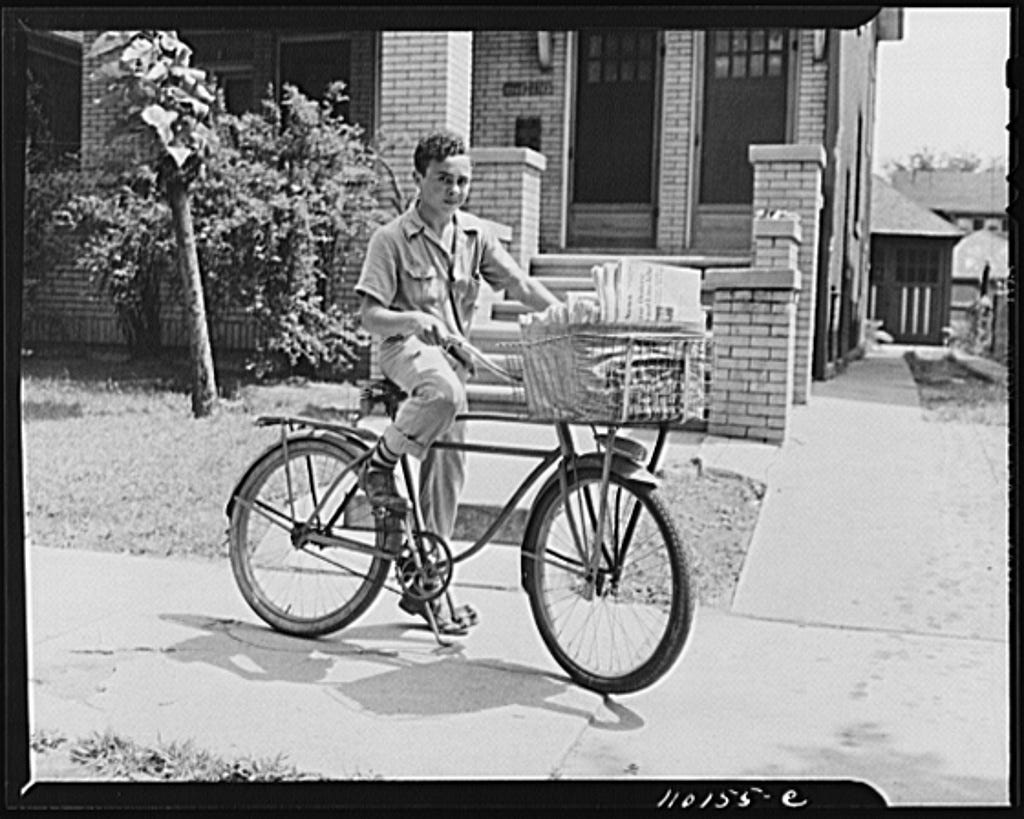
Love the text, not sure about the image. Lots of fists. Is this a response to trauma. Yeah, sometimes it is. Protect the self, fight for the self, defend each other.
fibres, nerves, and flesh
You can all but hear the buzz of the fly here.
You could not do it.
There is no near adjacency from humanity to life. We are the death bringers. But some might argue that we are so close to being able to supply this life. Robert is so close to being god.
Robert
or any ultimate bub.
Thoughtless Cruelty
What if it be thoughtful cruelty or thoughtless kindness?
This picture shows how I constantly am trying to connect people in my network with information in my web library.
I want to know if there is anybody who has gone from this "Moses" work into something further. Is there anyone who can model the work that needs to be done to carry Dan's work into the promised land. Step up!
They are reinventing the wheel
The curse of the Tower of Babel is not that it was created, but that we are doomed to re-create it. Sisyphus rolling the ball up the hill and...no teamwork. I think Obama should have stayed in Chicago and stayed a community organizer and done this work, a life's work just like you have made it. He would made more of a difference.
Without knowing it, I've been creating a platform of information and ideas that is waiting for a team of facilitators to turn it into a MOOC.
Emergent MOOC!
the four-part strategy
Or as Jarche would put it:
Step One: Seek information in the "library" Step Two: Make sense of that information in ways that appeal to others who are seeking information. Step Three: Share that information and facilitate its use. Step Four: Amplify and reinforce the work of those using the first three steps.
My hope
Help Dan:
Twitter Instagram Snapchat Tiktok Blogs
new people will be seeking solutions to old problems
And the problems morph and mount and fill all the available space.
Visit this article and find links to all sections of the library.
Put lever on fulcrum here!
began to build the library on the Internet
Better wins!
tutor/mentor program
Manifold and multiplicative wins. Leveraging wins for others!
build a library of information
Always a win!
learning to use best available information to support decisions of leaders
One ring to rule them all.
spent three years in the US Army, in the Intelligence branch
A win again!
studied history
A win!
an elevator speech
Where are the spaces where this can happen?
Not elevators. Just kidding, but we need to ask where we can talk so as to be heard.
the 12-16 years
How in God's name can we do a damned thing about climate change in ten years if we can sustain the investment of time to support kids moving through K-12. Our institutional frames aren't doing this. We need new institutional frames.
frames
I am a mole, a mole.
I dig under
your research agenda
as if it never was.
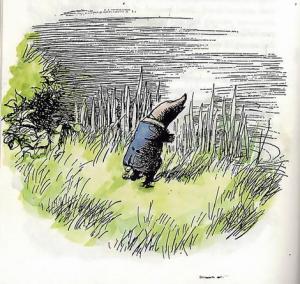
The Leveling Up study
My annotatory take on the affinity space of the page: me, the authors and now you, too, in this text box affinity space inside the blog affinity space in th comments. Boxes inside of boxes inside of boxes with permeable margins in a feldgang that keeps on going.
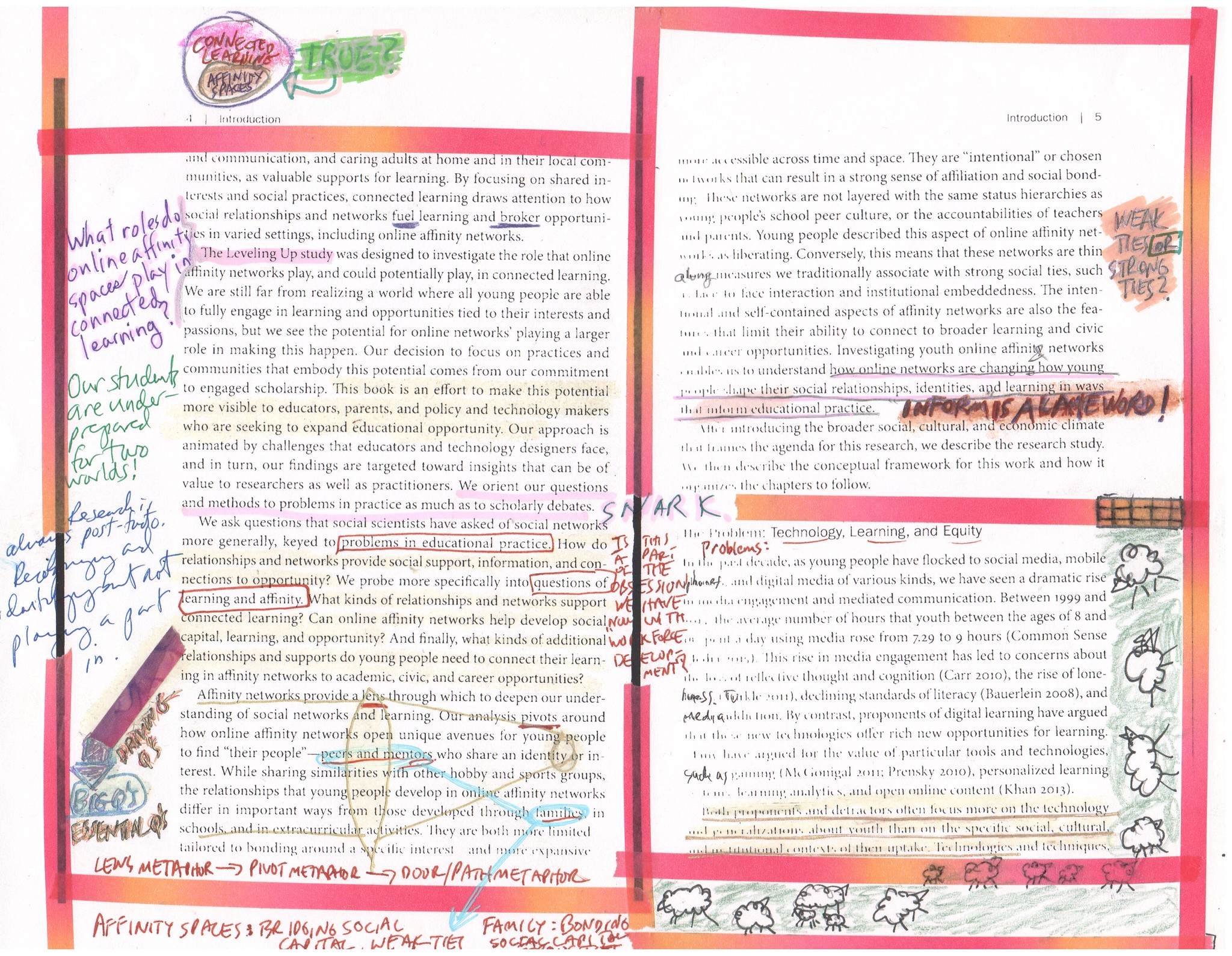
a lens
Metaphors gone wild:
a lens
a pivot
a door
a path
maybe even an elephant in the room?
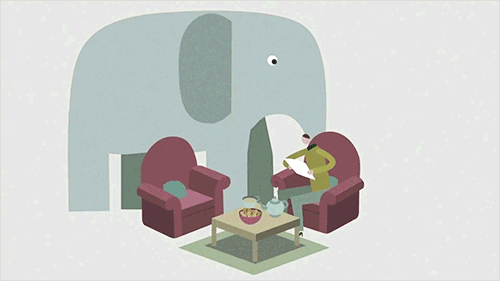
Exam Wrapper
I don't care how good the pedagogic tool is in theory, if it is just another way to run out the semester clock and make it appear that we are making all the right moves, then I say to hell with that tool. I'd rather improvise than use a tool I don't really believe in.
My concern is about his answer to the student who asked what to do if she still "doesn't get it" after watching a video.
We often talk about teachable moments for our learners but we don't extol the same learnable moments for teachers. Kinda points to the stark and happy truth that we are all learners under the skin. All of us. I worry about all those moments that I miss.
created his own along with a set of homework questions.
I love instructor's who "ante up" and then raise the ante.
explained
Yes, rationalizing is so important--for yourself and for others. If he didn't find the tool useful he should have said that as well.
validated
Caring...yes, he seemed to care at the beginning but fell victim to my biggest teaching challenge: biting off more that I or, more importantly, what my students can chew in one class. I think we need to do trial balloons for these techniques, ask them if they thought they were useful, and then proceed from there with using them regularly or not.
Daily quizzes on readings
The quizzes have to be low stakes and highly relateable.
this survey helps you connect your classroom and online experiences to the practices you will learn more about in this module.
My experience <------------>Course practices: this survey will connect me. No. I will connect them myself. This is a common mistake to put the teacher cart before the learner horse. It is wrong to assume that just because teachers 'teach' that learners will learn. Wrong.
Leading global health
"I said that the world is absurd, but I was too hasty. This world in itself is not reasonable, that is all that can be said. But what is absurd is the confrontation of this irrational and the wild longing for clarity whose call echoes in the human heart." Albert Camus

less concerned about what has been done before.
You are your own potentiometer.
Kintsugi.
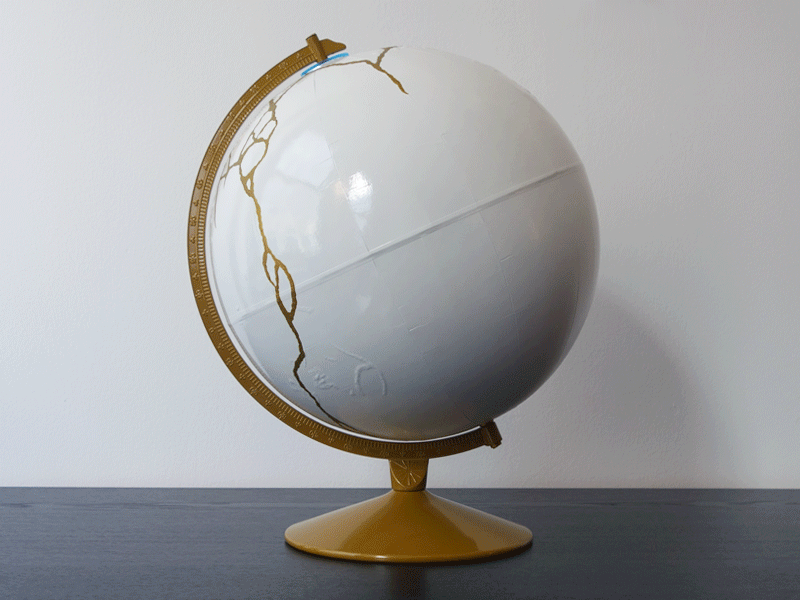
shredded...
spilt
split, your universe was split or at least creased like a piece of paper stained and folded into a new universe.
bloody art...lost
Only bloody art is never lost. Bloodless art is will and truly riddance to rubbish.
was spilt over
I love the passive voice here. Fate.
The paradoxes inherent in the degrees of institutional support for the type of professional learning Jasmine desired also emphasize how professional development contains inescapable tensions when the populations of concern are historically mar-ginalized groups (
Professional development "contains inescapable tensions" for all teachers, especially outsiders. I have always been struck by how ed schools have ignored the work of those in adult training and learning research. That field notes the primacy of informal training over formal training. Is this the tension our authors speak of? Personally, formal training PD meant jack squat unless it coincided with helping me solve a particular problem I am not sure how this is 'paradoxical'.
investigates

Anti-Vaxxers
What does this mean?
or to teach others to use the platforms to create on-gong map stories.
J-schools. Just look at the great response David Sirota got with his unearthing of funding for O'Rourke and Cruz in the Texas race. https://www.theguardian.com/commentisfree/2018/dec/22/beto-orourke-voting-record-2020-election-democrats
it is a dead end
Amen, someone stand up and help.
Motivating and teaching
Amen, I stand among those motivated and continuing to learn.
platforms offer many challenges.
Challenge = Sacrifices = Purpose and Worth
the concept map below
I feel like I am on a tilt-a-whirl as I look at this and when I go inside it I feel the forces throwing me ever outward.
investment
What does this word mean generally? And specifically in this context? If it just about money, then it is perfectly understandable that there is no money entering the O-Zones. But what if we had many different definitions of "investment" and analyzed accordingly?
Using the Chicago Health Atlas you can also create maps showing health disparities, which are indicators of investments needed in different areas of Chicago.
Researchers can also use maps long term as a way to demonstrate economic gain or loss. Your mappings are invaluable for just that one reason.
Hospitals can be
Some observations from outside:
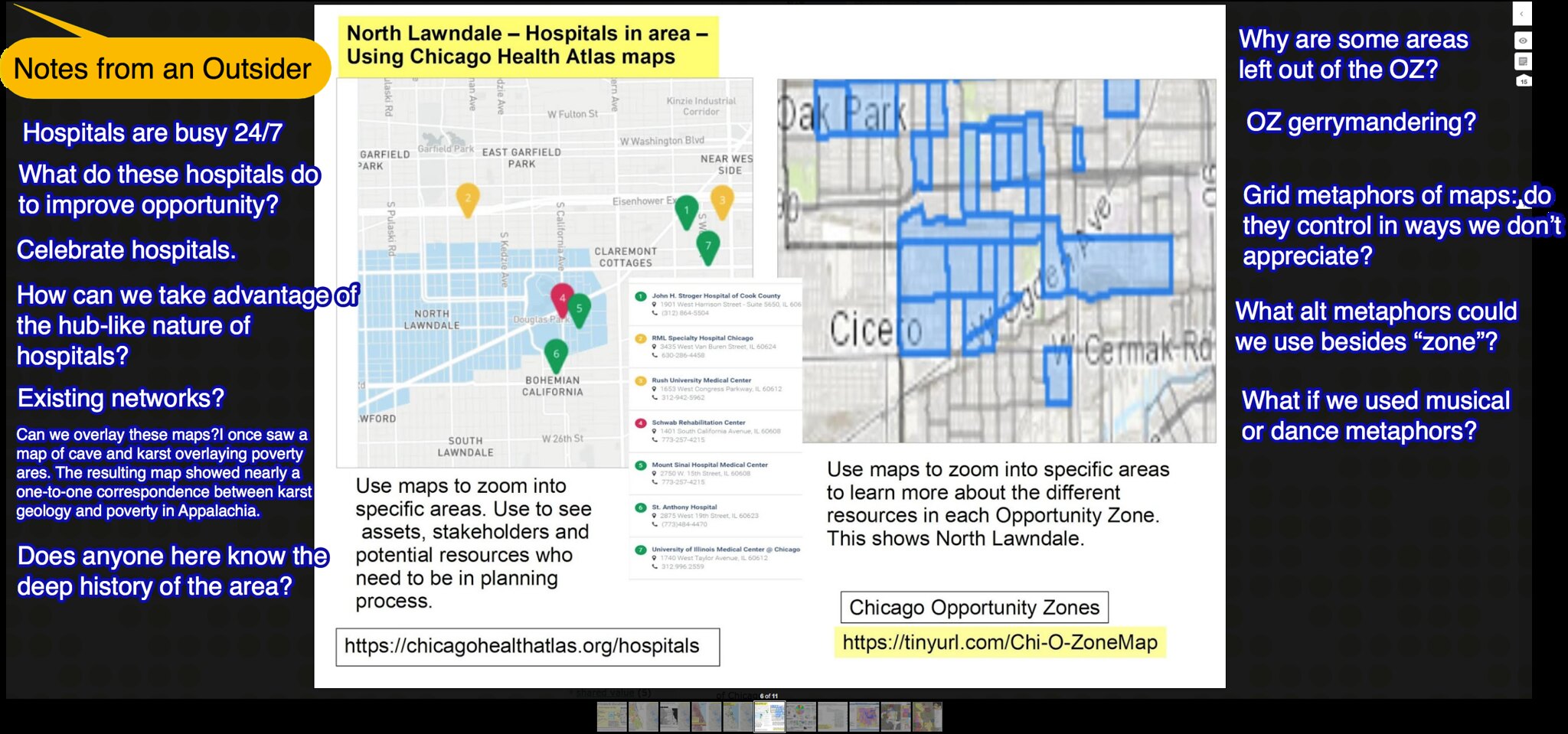
A closer inspection of my map would show the wide range of programs on the map, and the lack of these programs in many of the O-Zone areas.
Step five: draw conclusions from the maps, i.e. what do the maps tell us about the answer to the questions in Step Two?
I created a short link that I could share easily. h
Step four: find a way to share and then...share.
My friend Dan Isherwood
Step three: consult the network.
“What neighborhoods are affected?” And, “What indicators were used to show these areas need this government supported capital investment?”
Step two: ask good questions relating to something actionable.
I've been trying using maps to help people form those "partnerships and connections".
First step: connect to something I know about or know how to do.
Derek R.B. Douglas
Leveraging: look here for a history of its frequency--hockey stick!
The biggest thing we have to do when we leave this room is form the partnerships and connections to get to work.
I might argue that what you need to do is to bring more folks into the room.
Apt section of "Clueless": https://www.youtube.com/watch?v=Ndv1UfKIluw
To me, part of those actions
I think this is the key: find out what you gonna do, Boo.
We can't let perfect be the enemy of good.”
There is actually a Wikipedia article addressing this proverb.
scroll through the Tweets
I was unfamiliar with trendsmaps: https://www.trendsmap.com/local/us/chicago?utm_source=twitter&utm_medium=social&utm_campaign=al&utm_term=h##liveaturban
#LiveatUrban
I put this in my Tweetdeck and also followed @urbaninstitute. In the process I discover a blind spot: I complain about how most people have a 'flyover' attitude about rural areas maybe I have the same attitude toward urban areas.
Malcolm X College
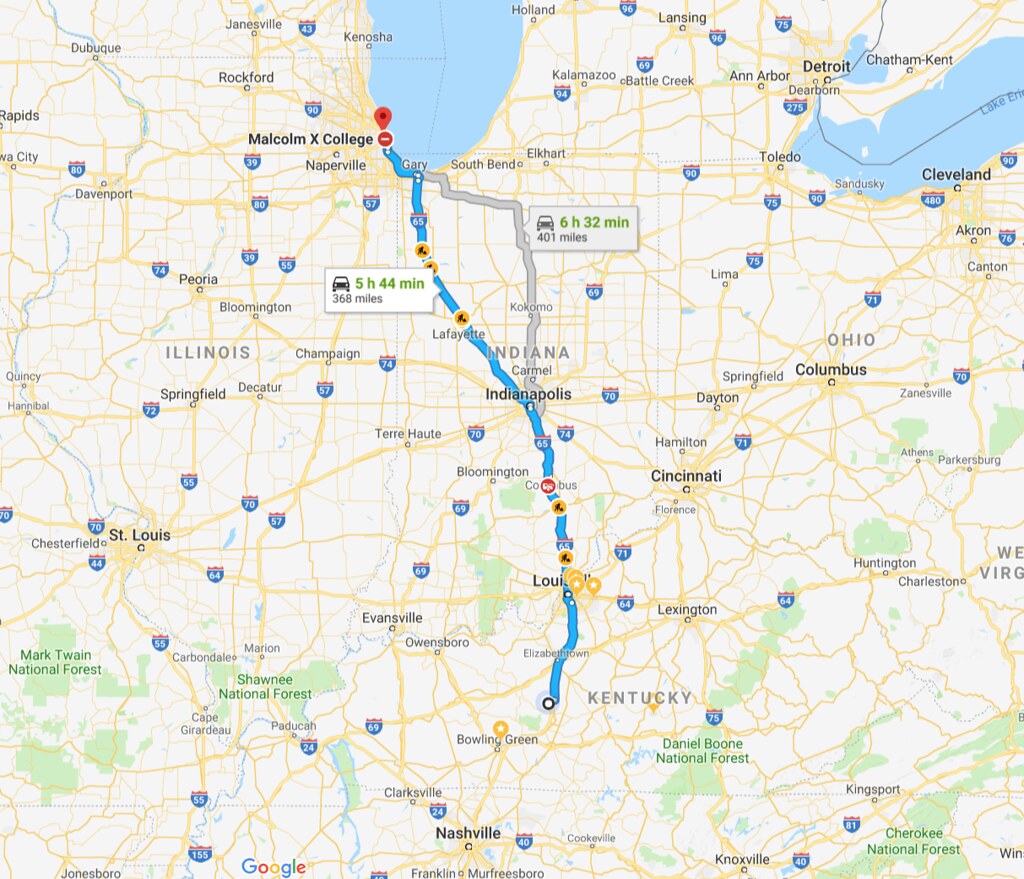
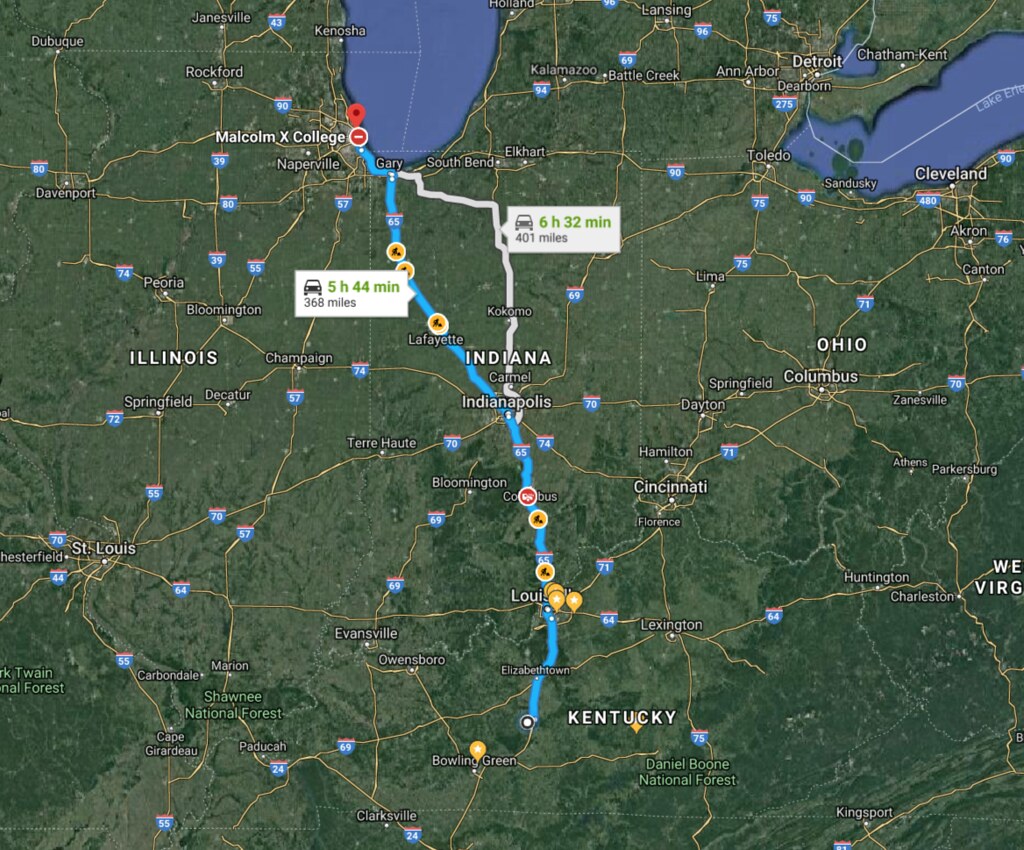
than by any service project that I might do.
This is your service project.
bridge the divides
laying the stones of social capital across the chasm
to connect
Yes, and I with you and others, too.
I'll be at my computer tomorrow
As will I...
TOPNET
Do you know how to access your syllabus in TOPNET?
David Williamson Shaffer says that we need to make space for conversations in order to be creative. “Creativity is a conversation — a tension — between individuals working on individual problems and the professional communities they belong to.”
I wonder what is the tension between us in #modigiwri. What conversations are being inspired? What conversations need to be inspired in our spaces? What problems should we be addressing? What are our unique problems arising from our own spaces?
click
OED defines:
click, v.1
(klɪk)
[Found only since 16th c.: it agrees in form and sense with Du., LG., dial. Ger. klikken; also partly in sense with OF. cliquer (Cotgr.). How far these are connected is uncertain: the word is of echoic origin, and may have arisen independently in different langs. In English and Teutonic generally, it appears to stand in ablaut relation to clack, as expressing a thinner and lighter sound; cf. chip, chap, clip, clap, clink, clank.]
1611 Cotgr., Cliquer, to clacke, clap, clatter, clicke it. a 1682 [see clicking ppl. a.] 1714 Gay Sheph. Week Frid. 101 The solemn death-watch click'd the hour she died. 1816 Kirby & Sp. Entomol. (1843) II. 302 It clicks as if it was walking in pattens. 1853 Kane Grinnell Exp. xxxiii. (1856) 287 The ice sounded‥ like some one hammering a nail against the ship's side, clicking at regular intervals. 1929 C. Day Lewis Transitional Poem ii. 32 Desire clicks back Like cuckoo into clock. 1937 C. Beaton Diary 3 June in Wand. Years (1961) 311, I clicked away. 1948 Mind LVII. 485 After trying to recall a face, one often says, ‘Ah, now I remember the man you mean.’ In such cases we seem to feel something happen: something, as it were, clicks to. 1950 D. Gascoyne Vagrant 14 When Abbott's camera clicked.
b.1.b with object of result.
1819 Crabbe T. of Hall x. Wks. 1834 VI. 236 Who would bear his chains And hear them clicking every wretched hour. a 1832 ― Posth. T. Wks. VIII. 17 The clock that both by night and day Click'd the short moments.
c.1.c Of a horse: see click n.1 3.
1713 Lond. Gaz. No. 5170/4 Sometimes clicks in his Pace.
d.1.d fig. To meet or fall in with (a person) fortunately or at the right moment; to be successful; to fit together or agree exactly; to become friendly with someone; to strike up a rapport with (a person); to be a success in the theatre or other form of entertainment. colloq.
1915 T. Burke Nights in Town 107 The bright boys‥saunter‥up and down that parade until they ‘click’ with one of the ‘birds’. Ibid. 108 You have ‘clicked’. You have ‘got off’. 1921 Wodehouse Jill the Reckless viii. 120 A grey world in which, hoping to click, we merely get the raspberry. 1922 ― (title) The Clicking of Cuthbert. 1923 ― Inimit. Jeeves iv. 40 ‘Did you click?’ He sighed heavily. ‘If you mean was I successful, I must answer in the negative.’ 1926 Amer. Speech I. 436/2 [Show business slang]. A turn is said to click when it proves to be successful, or in the vernacular, ‘gets across with a bang’. 1927 Vanity Fair Nov. 67/2 He doesn't hope that he makes good. He hopes that he ‘clicks’. He trusts that he doesn't ‘flop’. 1930 Times 29 Mar. 10/4 The objects are arranged but not composed‥so that they remind you a little of people assembled harmoniously but lacking some common emotion. They don't ‘click’. 1931 J. Cannan High Table xi. 164 Getting drunk when he was trying to click with a Glasgow buyer. 1934 C. Lambert Music Ho! iii. vii. 208 Receiving the glad eye from presumably attractive girls with whom he ultimately and triumphantly ‘clicks’. 1952 V. Gollancz My Dear Timothy xx. 316 To prove satisfactorily that a lot of these devices wouldn't ‘click’. 1958 Observer 20 Apr. 14/6 Put out under pressure to fill the gap‥it [sc. the B.B.C. television programme To-Night] clicked instantly and is still the pride of British television.
e.1.e To come in for something; spec. to get killed. Mil. colloq.
1917 Empey From Fire Step 81, No. 1 Section had clicked for another blinking digging party. 1917 W. Muir Observ. Orderly 226 To click can be either advantageous or baneful, according to the circumstances. A soldier asks a superior for a favour, and it is granted. That soldier has clicked.‥ But he has also clicked if he is suddenly seized on to do some menial duty. 1919 Athenæum 11 July 582/2 The verb ‘click’‥has developed some passive meanings, such as to get killed. Ibid. 8 Aug. 729/1 To ‘click for fatigue’ is to ‘come in for’ a fatigue duty at the psychological moment. 1966 Listener 22 Dec. 927/1, I came out of hibernation‥to find that I had clicked for a most alarming job.
f.1.f To become pregnant, to conceive. colloq.
1936 N. Coward Fumed Oak ii. ii. 58 A couple of months later you'd told me you'd clicked, you cried a hell of a lot, I remember. 1954 Landfall VIII. 228 In Wellington, just before he came down there was Heather, who had ‘clicked for a baby’.
g.1.g To ‘ring a bell’, fall into context. colloq.
1939 ‘M. Innes’ Stop Press ii. iv. 269 Something clicks. Tell me. 1960 A. Burgess Right to Answer ii. 37 Then the name clicked, because somebody in the town had talked about Everett.
1581 T. Lovell Dial. Dancing, He trips her toe, and clicks her cheek, to show what he doth crave. 1605 B. Jonson Sejanus ii. ii, Jove‥at the stroke click'd all his marble thumbs. 1654 Gayton Pleas. Notes iii. viii. 124 Humble your selves, and click your Chains to th' ground. 1830 Marryat King's Own xxxiv, They‥clicked their glasses together. 1830 Tennyson Owl, Merry milkmaids click the latch. 1918 W. Owen Let. 20 Mar. (1967) 541 Mrs. A. can click the piano quite quickly. 1930 C. V. Grimmett Getting Wickets iii. 59 The method of spinning is similar to that used in clicking the finger and thumb to attract attention. 1936 Wodehouse Laughing Gas xviii. 203 He was clicking his tongue in gentle self-reproach. 1938 J. Hilton To You, Mr. Chips i. 51 No upstart authority has yet compelled him to click his heels and begin the day with juju incantations of Heils and Vivas. 1958 M. L. Hall et al. Newnes Complete Amat. Photogr. 156 All one has to do is to point the camera and click the shutter.
b.2.b Also with adv., as click out, click up, etc.
1895 Westm. Gaz. 17 Apr. 8/1 How assiduously some of the political typists must have been clicking out these words of late. 1930 ‘A. Armstrong’ Taxi v. 46 And so for the next seven years the meters clicked up 1/- a mile. 1962 J. Dill in Into Orbit p. xix, A robot could easily click off pictures automatically or take measurements of radiation and heat.
c.2.c To get, receive. Mil. colloq.
1917 Empey From Fire Step 39 Shut your blinkin' mouth, you bloomin' idiot; do you want us to click it from the Boches? Ibid. 65 Trench mortars started dropping ‘Minnies’ in our front line. We clicked several casualties. 1944 J. H. Fullarton Troop Target xxx. 213 They tell me Micca's a good picquet to click.
3.3 techn. To rule with a machine pen, the wheel of which clicks.
1869 Eng. Mech. 5 Nov. 166/1 This operation of clicking [i.e. ruling the pattern on paper] is the really curious part of the manufacture [of tartan woodwork.] Ibid. 166/3 He ‘clicks’ his pen to the first white line‥Over sheet after sheet he clicks away.
4.4 Printers' slang. (See quot. and clicking vbl. n. d.)
1860 Ruse & Straker Printing 121 A work is said to be ‘clicked’ when each man works on his lines, and keeps an account thereof.
Draft partial entry June 2001
▸ Computing. a.a trans. To press (one of the buttons on a mouse) and release instantaneously or hold down while performing another action; to activate (a program function) or select (a particular item) in this way, having first positioned the cursor on the appropriate part of the computer screen.
1982 Byte (Nexis) Apr. 242 They would be selected by pointing to them with the mouse and clicking one of the buttons. 1991 Macintosh User's Guide for Macintosh PowerBook Computers ii. 11 When you click an icon, it becomes highlighted (the icon is darkened). A highlighted icon is said to be selected. A selected icon is the object of whatever action you choose next. 2000 PC World Nov. 250/3 Click an entry and drag it to the Insert menu‥When the Insert menu drops down, drag the mouse pointer to where you want the command, then release the mouse button.
b.b intr. To press (and release) one of the buttons on a mouse; to activate a program function or select a particular item in this way, having first positioned the mouse pointer on the appropriate part of the computer screen. Freq. with on.
1984 PC Mag. (Nexis) 17 Apr. 214 To move a window intact with a mouse, you would first click on the top left of a window and then click at the desired new location of the left-hand corner. 1989 Computer Buyer's Guide & Handbk. 7 vi. 29/2 You insert the program disk and click on the Install icon. 1991 UnixWorld Oct. 102/1 You choose the text tool and click to invoke the text dialog box. 1997 J. Seabrook Deeper v. 163 The trick was to hit a site, browse it, see a link, click on it, and get transferred to another site.
Dictionaries

Canaries in the Coal Mine
Yes, who indeed is the canary and who the miner anymore?
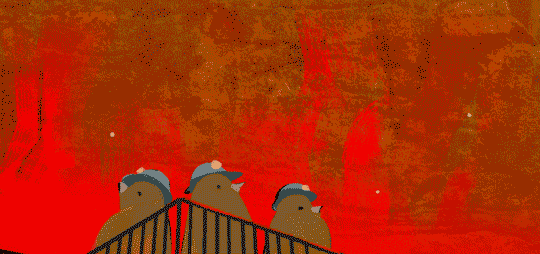
Are these offshoots mere distractions, particularly given they don’t thematically connect? Or are these blooms, taking root from the original, giving another context to the word choices that Anna made? Is the reader in me, interpreting? Or the writer in me, adding personal perspective? What role does the reader bring to a text as a writer? Why did I add images? Do the images distract or enhance the writing? What does it mean that I wrote this all in the margins of Anna’s text, and that you may never have seen it if I didn’t leave links scattered about? Does that kind of marginalized writing still have meaning? Is it public writing? Private writing? Writing?
If I had not pity responses I'd have no responses at all.
Oh and Sherri pulled together the folks who are blogging with #modigiwri.
I have been left off of both of your lists for #Modigiwri. Did I fail to pay my membership fee?
I’ve been failing miserably at the 30-day writing challenge to write at least 150 reflective words and post them
A tweet that reflects a little differently
re-engineered knowledge-base and micro-credentialing system
Is this coming or am I just not seeing where it is?
With support from the Bill and Melinda Gates Foundation, NWP seeks to develop new pathways which expand access to our professional learning community and support a new generation of teachers to become teacher-leaders in their local communities.
Does this mean that we are developing and supplanting the 'signature summer institute'. Might as well considering that some, like ours is reduced to being a one-week summer course. I hate that this happened without my input and leadership.
Building and promoting this infrastructure involves four goals: Create a new set of models for how local Writing Project sites can address the problem of expanding access to leadership in a sustainable, long-term way. Re-engineer the NWP 'knowledge-base' for leadership-development programs to support these new models. Develop a certification-style entry to NWP to allow local Writing Project sites to recognize and designate teacher-leaders beyond traditional attendance at Invitational Institutes. Manage dissemination both within NWP and to the broader field in order to promote use of the new infrastructure.
No idea. Seems like a long-term survival guide that relies on Gates money instead of federal/state money. If so that seems a bit fear driven, top downist.
underserved communities of teachers
Seems like we want to serve everybody even while we are encouraging underserved to participate.
BNPL supports a network of diverse local Writing Project sites in designing, testing, iterating, and disseminating new program models that expand NWP communities of practice in order to increase leadership opportunities for teachers otherwise not served by local Writing Project sites.
Supports? How? A network? What kind? Where is it? Canany NWP local site participate and how would that look. Use cases? New program models? Seems like they are applying program models
expand teacher leadership for improved literacy learning
Purpose. OK, but what does this mean? Expand? Leadership? Literacy learning?
design and dissemination effort
What is "design and dissemination"? Sounds pretty buzzwordy.
Explore
OK, that is one way. Perhaps we can facilitate other ways in. How have people actually used this? Has this been created because the money was there to create it or was it created because of a felt AND expressed need, expresses by the users?
drop-down menu or from the tiles on the Write/Learn/Lead homepage.
Navigating, but to what purpose?
Categories can be viewed
Look into categories. Implies that you have a category or question in your head already. How do I fit my block into the right hole?
Our aim has been to reflect at least a couple of realities for Writing Project teacher leaders: the urgency of finding adaptable models, such as prompts or strategies for an upcoming workshop, and the need for texts that support rich conversations and provide theoretical/scholarly foundations for our work. The summaries that introduce individual resources were written to reflect these different audiences and needs.
It is not entirely obvious to me how I do this.
The Knowledge Base
Reminds me of the London cabbies' internal map of the city called "The Knowledge". Now all we need are some maps for how to use this. As the buzzologists say--to actualize this.
A poem for annotators everywhere.

Few were aware of the local school data that reported a graduation rate hovering around 50 percent for all students but 25 percent for African American male students.
This is a legitimate "deficit narrative". Legitimate because it is fact-based but more importantly it is meant to spur action toward a "surplus narrative" where we can all have enough and more learning.
I am inviting a few students from writing classes to enter into this discussion. They are insanely busy this time of year, but I will ask. Maybe others could be invited?
tensions
What do these tensions mean? Opposites? Maybe what Robert Fritz talks about in his book, The Path of Least Resistance
Maybe this isn’t the end. Maybe this is just the start.
AS I remarked in Storybird, "X" marks the start, not the spot.
threshold, as Terry called it, of the conversation.
We cross these thresholds all the time. Mostly we do not acknowledge them as boundaries at all. Mostly we do not note how they 'feel' and what the feeling means. Unaware, we fiddle while Rome burns.
I simultaneously wrote what I knew I would write and let the art push me in different directions.
Not unlike a poetic form like a sonnet. We work within the constraints of the form and find, to our joy, they are no constraints at all. They are liberating.
this kind of platform adventure
http://downloads.bbc.co.uk/schoolradio/treasure_island/song01_full_vocal.mp4
a blog post that tracks the flow over the day of wandering and wondering
This is what I call a feldgang. Here is a previous blog post helping to explain the concept.
In other words, in addition to the analysis of threats to critical scholarship that are unequivocally positioned as coming from ‘the outside’, we need to examine what it is about ‘the inside’ – and, particularly, about the boundaries between ‘out’ and ‘in’ – that helps perpetuate the status quo.
Threats, existential or otherwise, spring from everywhere. We need to know them well wherever they arise and however they threaten. NO BLIND SPOTS.
In this, I am fully in agreement with Latour that it is important to keep tabs on the difference between matters of fact, and maters of concern; and, perhaps most disturbingly, think about whether we want to stake out the claim for defining the latter on the monopoly on producing the former.
No idea what this means.
other Messianic visions
Jerusalem ["And did those feet in ancient time"] BY WILLIAM BLAKE And did those feet in ancient time Walk upon Englands mountains green: And was the holy Lamb of God, On Englands pleasant pastures seen!
And did the Countenance Divine, Shine forth upon our clouded hills? And was Jerusalem builded here, Among these dark Satanic Mills?
Bring me my Bow of burning gold: Bring me my arrows of desire: Bring me my Spear: O clouds unfold! Bring me my Chariot of fire!
I will not cease from Mental Fight, Nor shall my sword sleep in my hand: Till we have built Jerusalem, In Englands green & pleasant Land.
Source: Preface to Milton a Poem. (1810)
disavowals of social privilege (“I come from a working class background”), which, admirable as they may be, unfortunately only serve to justify the hierarchical nature of academia and its selection procedures (“I definitely deserve to be here, because look at all the odds I had to beat in order to get here in the first place”).
Great example.
tenure track
tenure track = business class flying: same kind of justification to entitlement.
What can explain the relationship between the relative proliferation of critique, and relative paucity of resistance?
Worthy question. perhaps one answer might be 'risk', the energy needed to take risk is considerable.
between Stephen Downes and George Siemens
Here is a Vialogue version of this conversation. Join for free then join in the free for all: https://vialogues.com/vialogues/play/46987/
Why are we teaching in a way that is counterintuitive and not personally satisfying to students?
I cannot teach to or even toward the idea of satisfaction. It makes no sense to me. We make an assumption in this: teaching evokes learning. We teach;therefore, they learn. I apply this to all teaching, even what is generally acknowledged as good teaching. The assumption does not hold.
interrogate
This is such an ugly word. Who has the power to interrogate? Ugly.
I read books for research every day . This is a kind of alternate dimension for the digital world, as most commentary focuses on easily Web-available content. Like podcasts, I find print underappreciated for the technology and education scene.
paper text
2. Sense, or Reflections Working through the above material, I make several determinations. I look for patterns and signals of possible futures, sketches of emerging trends which can shape what comes next. Repetition of the same story or pattern across channels can be useful in this regard. I draw on my experience, my intuition, and context to assess the utility of each story. I like to reflect while immersed in the digital world, searching for context and commentary, then taking myself offline. In the home office this can mean taking a walk, working on the homestead, or doing physical exercise. This frees up my mind to range broadly and to be more creative. Then I consider how best to share these thoughts and discoveries in a way that adds value. So I weigh audiences and their needs, venues, and ways of entering conversations. Which brings us to…
sense
3. Share, or Outputs Where to share my questions, comments, broodings? A major outlet is social media, such as comments on someone’s blog post, a Facebook update, a Google+ post, or, most commonly, a Twitter ping. Some Web content ends up in my social bookmarks (Diigo, Pinboard, and yes, even Delicious, still). I comment on print book readings on Goodreads (NB: both for research and entertainment). Longer reflections appear as posts on this very blog. I always hope for discussion, rather than static posting from these social media emissions. My work involves a steady stream of presentations, both face-to-face and virtual, and these information inputs naturally end up there (some on Slideshare). Every month I publish another Future Trends in Technology and Education report, largely driven by this process. At greater length and temporal remove from this daily torrent of info-wrangling are my articles and books; reflections ultimately land therein.
share